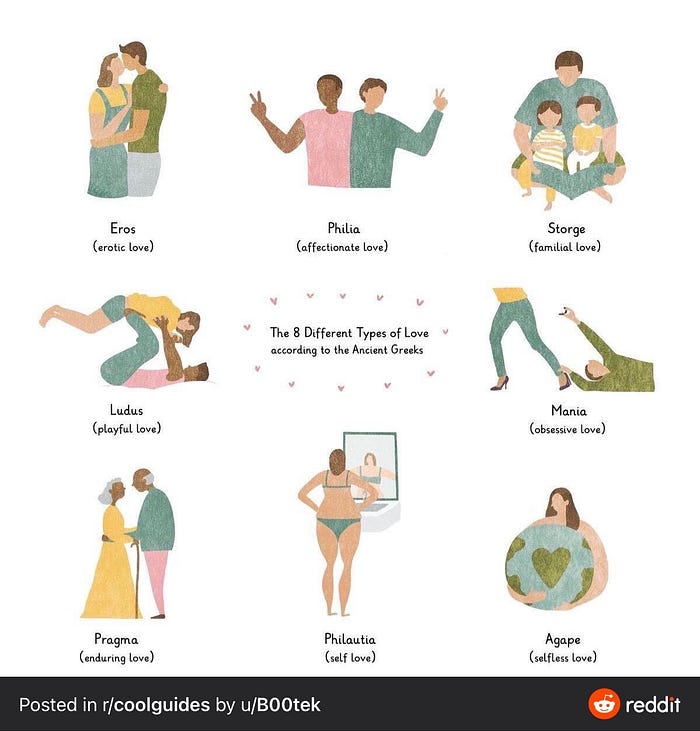
Love is one of the most complex and fundamental human emotions. Countless stories, songs, and works of art throughout human history have explored this theme. However, love is not a monolithic concept, and different cultures and languages have developed diverse words and concepts to describe the many forms of love.
The ancient Greeks, in particular, had a nuanced and multifaceted understanding of love. They developed different words to describe different types of love and their effects on human relationships. In this article, we will explore the eight different types of love identified by the ancient Greeks. We will also examine how these types of love can provide insights and inspiration for modern relationships. Whether you are looking to deepen your romantic connection, strengthen your friendships, or cultivate self-love, there is much to learn from the wisdom of the ancient Greeks.
Love is a complex and multifaceted emotion that can take many different forms and meanings. At its most basic level, love can be defined as a strong feeling of affection, attachment, or devotion towards someone or something. However, this definition barely scratches the surface of what love truly means and entails.
One common distinction in the study of love is between romantic love and non-romantic love. Romantic love is often associated with passion, intimacy, and commitment, and is typically expressed in the context of a romantic relationship. Non-romantic love, on the other hand, can refer to a range of emotions and behaviors, such as friendship, familial love, self-love, or altruistic love.
Another way to understand love is to consider its different elements or components. According to some scholars, love can be broken down into three basic components: intimacy, passion, and commitment. Intimacy refers to the emotional closeness and connection that two individuals share, while passion refers to the physical attraction and desire that they feel for each other. Commitment, in turn, refers to the decision to stay together and work on the relationship over time, even in the face of challenges and setbacks.
However, these components do not necessarily apply to all forms of love. For example, self-love may not involve passion in the same way that romantic love does, but it can still involve intimacy and commitment to oneself. Similarly, friendship may involve intimacy and commitment, but not necessarily passionate attraction.
Understanding the different types of love and their components can help us navigate the challenges and opportunities of human relationships, and cultivate more meaningful and fulfilling connections with others.

The ancient Greeks had a rich and nuanced vocabulary for love, with different words to describe different types of love and their effects on human relationships. Here are the eight types of love as identified by the ancient Greeks:
Eros: romantic, passionate love
Eros is the type of love that is often associated with physical attraction, desire, and sexual passion. It is often depicted as a force that overwhelms reason and logic, leading people to act impulsively and recklessly in pursuit of their beloved.
Philia: friendship, companionship
Philia is the type of love that is based on mutual respect, shared interests, and common values. It is often seen as a deeper and more enduring form of love than eros, as it is built on a foundation of trust and compatibility rather than just physical attraction.
Storge: familial love, affection
Storge is the type of love that is found in family relationships, such as between parents and children, siblings, or extended relatives. It is often characterized by a sense of duty, loyalty, and protectiveness, as well as affection and fondness.
Agape: altruistic love, compassion
Agape is the type of love that is selfless, unconditional, and focused on the well-being of others. It is often associated with acts of kindness, generosity, and compassion, as well as spiritual or religious devotion.
Ludus: playful, flirtatious love